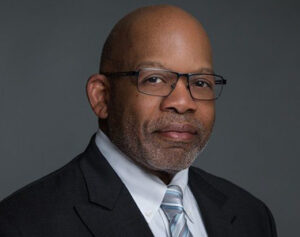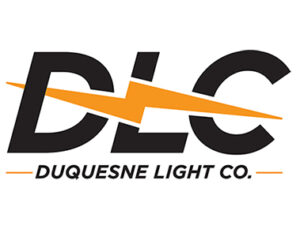 Kevin Walker, president and CEO of Duquesne Light Holdings Inc. (DLH), is playing a key role in powering southwestern Pennsylvania’s transition to a clean energy future for all.
Kevin Walker, president and CEO of Duquesne Light Holdings Inc. (DLH), is playing a key role in powering southwestern Pennsylvania’s transition to a clean energy future for all.
Appointed to the post in June 2021, Walker became one of the highest-ranking African American executives in Pittsburgh where he leads Duquesne Light Company (DLC), the city’s electric utility; fiber-optic cable services provider DQE Communications; and energy services firm The Efficiency Network — all affiliate companies under DLH.
Walker’s ascension during this pivotal period of the nation’s reckoning with the future of energy led to his recognition as one of Savoy Magazine’s “2022 Most Influential Black Executives in Corporate America.” The publication praised Walker and his fellow honorees as “innovative trailblazers.”
As an electric utility, DLC is tasked with providing safe, reliable, resilient and affordable energy to more than 600,000 customers. Under Walker’s direction, the company is committed to modernizing the electrical grid; building the workforce of tomorrow; and ensuring equitable and affordable access to a clean energy future.
The organization’s vision is this: “A larger-than-light, clean energy future for all. Delivering exceptional results today; boldly harnessing opportunities for tomorrow.” But that isn’t just an idea. Walker is working to fast-track DLC into a next-generation, trusted energy partner, while also positioning it as a blueprint from which other utilities can chart their courses.
Part of Walker’s forward-thinking strategy involves promoting “the electrification of everything.” He believes that it’s not only right for customers, but also the economy and environment. This belief is a critical reason why DLC continues taking measures to reduce its own carbon footprint while enabling customers to do the same through a grid that is increasingly fed by carbon-neutral sources.
“All roads lead to electrification, whether it be electric transportation, public and private; electric heat pumps and hot water; building weatherization and electrification; and electric uses in manufacturing, such as electric arc furnaces,” said Walker. “It’s the right thing from an efficiency, economic development and climate protection standpoint.”
manufacturing, such as electric arc furnaces,” said Walker. “It’s the right thing from an efficiency, economic development and climate protection standpoint.”
Earlier this year, Walker participated in a task force led by the Allegheny Conference on Community Development (ACCD) to release a report on the Pittsburgh region’s energy future. The report outlines a path to ensure a low-carbon future in southwestern Pennsylvania through efforts that include electrification. Shortly after the ACCD report was published, DLC issued a detailed whitepaper on beneficial electrification and its role in decarbonizing the Pittsburgh region.
Building strategic partnerships and rallying teams in service to others is nothing new to Walker. He earned his bachelor’s degree in engineering from the United States Military Academy (West Point) and has more than 30 years of utility experience spanning multiple service territories across the U.S.
Before joining DLC in April 2020 as chief operating officer, he was senior vice president of customer and operations services and nuclear decommissioning at Southern California Edison, overseeing customer experience for more than five million accounts along with the on-site transfer of spent nuclear fuel from wet to dry storage.
Walker is currently focused on ensuring that investments made by his organization will produce success for the Pittsburgh region and beyond. He plans to take three critical assets to the next level:
Technological Investments
In 2021, DLC partnered with LineVision to install no-contact dynamic line rating sensors that use smart technology to assess the life of transmission lines and uncover additional grid capacity. The purpose of this advanced technology is to provide electric service that is more resilient, efficient and affordable, while making it easier to add generation assets like renewable energy to the existing grid.
Recently, the dynamic line rating approach has revealed the tested area has, on average, 25 percent more capacity.
Process Investments
Earlier this year, DLC’s Innovation Center launched a crowdsourcing competition to create a safer and more reliable underground electric network that is anticipated to have major implications for improving underground inspections throughout the utility industry.
ComEd and Pacific Gas and Electric recently joined the challenge to help DLC guide the finalists on solution testing and also evaluate the initial results.
Investing in People
Walker is also focusing on workforce development by attracting, elevating and retaining top talent within the organization. He said it starts with “being respectful and responsive to people’s needs and desires.” Under Walker’s leadership, his organization has responded to the challenges of the pandemic by creating a hybrid work model for office-based employees who do not work in the field.
When it comes to ensuring a clean energy future for all, Walker is quick to point out that no one should be left behind. Through his work with the Pennsylvania Chamber of Business and Industry, he is helping to establish energy policy proposals that will move the Pittsburgh region and the Commonwealth forward and ensure clean energy equity in urban and rural areas.
His organization is also intentional about partnering with local organizations to donate charitable dollars and volunteer for causes that have a positive impact on communities. In 2021, employees across DLH volunteered more than 3,200 hours. The organization also donated more than $2 million, including $250,000 to diverse grassroots nonprofits that support environmental justice, education and social equity.
DLC has also partnered with the New Pittsburgh Courier — a Pittsburgh-based publication devoted to covering issues in the Black community — to sponsor a weekly “Small Business Spotlight” that promotes local Black-owned businesses and economic development.
This past April, DLC was also given naming rights to the Introduction Room inside the Greater Pittsburgh Community Food Bank, which doubles as an intake center that offers resources beyond food, including LIHEAP, the Dollar Energy Fund and access to healthcare, for community members in need.
“Customers who are struggling from a food standpoint, from an energy assistance standpoint, from a healthcare standpoint — these are things that build up and really weigh down individuals, which weighs down our communities,” added Walker. “If we start relieving those things, we can all move forward together to a clean energy future.”
Walker is convinced that the Pittsburgh area, with its ever-growing role in innovation and sustainable practices, has everything it needs to thrive in the transition to clean energy. Through collaborative partnerships, innovative approaches and a steadfast commitment to their customers and communities, he and his team are leading the charge to advance Pittsburgh’s transformation to a low-carbon future for all.